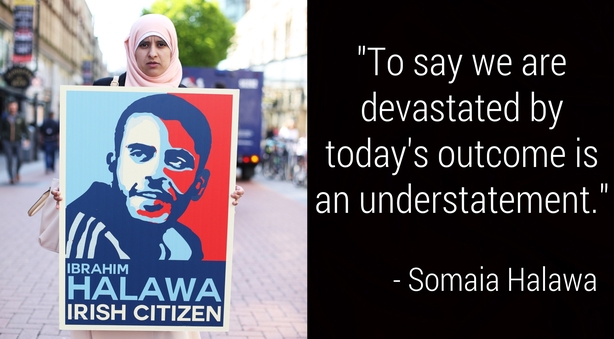The family of Ibrahim Halawa has said they will reapply for a presidential decree to secure his freedom from prison in Egypt.
Today, the trial of Mr Halawa was postponed for the 14th time, and has now been put back to 2 October.
Mr Halawa, from Firhouse in Dublin, has spent more than 1,000 days in prison.
The 20-year-old was arrested by the Egyptian army as he took refuge in a Cairo mosque while Muslim Brotherhood protesters staged a "day of refuge" outside in August 2013.
Mr Halawa is facing a mass trial alongside 493 other defendants, and faces a possible death sentence.
Speaking to RTÉ News, Mr Halawa's sister Fatima said that they had "high hopes" that his trial was going to be heard.
"To say that it is devastating is an understatement", she said.
In a statement earlier, the family said the decision by the judiciary to reopen the case and reassess video evidence came "as a surprise to our family, and the Irish Government, in circumstances where we all understood the proceedings would come to a conclusion today.
"This sparks a further delay, in what appears to be an indication that the trial will now start afresh in October."

Minister for Foreign Affairs Charlie Flanagan said he would be informing the Egyptian government of his disappointment over the latest delay.
"I am extremely disappointed at the news of a further delay in the trial of Mr Halawa," said Mr Flanagan. "This latest delay is a particular source of concern and frustration for Mr Halawa and his family. I fully share their sense of frustration.
"I will be conveying my concerns about this delay directly to the Egyptian government and, notwithstanding the separation of powers, I will be seeking more information of the review of technical evidence ordered by the Court and its likely impact on this trial."
Amnesty International has said there is no credible evidence against him and called today's postponement a "devastating blow" for Mr Halawa and his family.
It said that Egypt "continues to ignore its obligations under both Egyptian and international human rights law".
In a statement, the group said: "Amnesty International has declared Ibrahim a prisoner of conscience, based on its own eye-witness evidence that he could not have carried out the acts he is accused of.
"He was arrested and arbitrarily detained solely for peacefully exercising his right to freedom of expression and freedom of assembly."
It also said a "mass trial simply cannot meet the standards required for a fair trial as defined under international human rights law".
Mr Halawa's solicitor has said he wants to engage with the Irish Government to discuss a change of tactic for his release.
Speaking on RTÉ's Drivetime, Darragh Mackin said they can no longer wait for a trial to conclude. He said there is a mechanism available for him to be released prior to the conclusion of the proceedings.
He said that the reason for today's decision to postpone Mr Halawa's trial until October is largely unknown, but confirmed that video evidence is now to be considered.
Mr Mackin said that an "aggressive approach" has been adopted to ensure his release.
Meanwhile, an Australian journalist who shared a prison cell with Mr Halawa until last year before being freed has said the Irish authorities have a responsibility to call for his release.
Speaking to RTÉ’s News at One, Peter Greste said Mr Halawa is accused along with hundreds of other defendants and it is impossible for them to have any decent judicial process.
"It's incumbent now, not just on the Egyptian authorities to end this matter and release Ibrahim along with the other defendants, but also I think the Irish authorities have a responsibility to argue for the rights of Ibrahim - at the very least - and for his release under the same decree that I was transferred to Australia."
Mr Greste said that he believed it was the overall pressure from authorities and his colleagues in the media that lead to his release from prison and deportation from Egypt.

